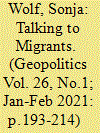| Srl | Item |
| 1 |
ID:
185628


|
|
|
|
|
| Summary/Abstract |
In June 2019, Nayib Bukele, a former mayor affiliated with the former guerrilla movement FMLN, became president of El Salvador at the head of a new party allied with a splinter faction of the right-wing ARENA party. Capitalizing on the corruption scandals that tainted the two major parties, the youthful businessman rode to victory on an anti-sleaze platform. He has made Twitter his government’s main communications platform, using symbolic politics to achieve high public approval ratings. But the president spurns openness and transparency in government, is hostile to the media, and openly defies the legislature and the judiciary, putting democracy at risk.
|
|
|
|
|
|
|
|
|
|
|
|
|
|
|
|
| 2 |
ID:
179519


|
|
|
|
|
| Summary/Abstract |
Individuals and families are being displaced from the Northern Triangle of Central America by structural and physical violence. Clandestine migration increases the invisibility of forced migrants and makes them difficult to access for researchers. Gatekeepers perceive or depict forced migrants as vulnerable populations and often deny investigators access to them, arguing that traumatised people should not be asked to retell their stories and be revictimised. The growing literature on research participation suggests that individuals categorised as vulnerable often decide to collaborate in studies, because they welcome the opportunity to talk about their experience to an empathetic listener and to help improve policies and services. Immediate distress produced by revisiting painful moments in life often dissipates quickly and is outweighed by the benefits of research participation, such as feelings of catharsis and a sense of acknowledgement and purpose. When gatekeepers deny investigators access to vulnerable population groups, they preclude them from autonomously deciding whether to grant or withhold informed consent and from exercising their right to participate in research. Their invisibilities and silences render migrants more susceptible to human rights violations. Taking protection seriously means widening the research participation of vulnerable individuals.
|
|
|
|
|
|
|
|
|
|
|
|
|
|
|
|